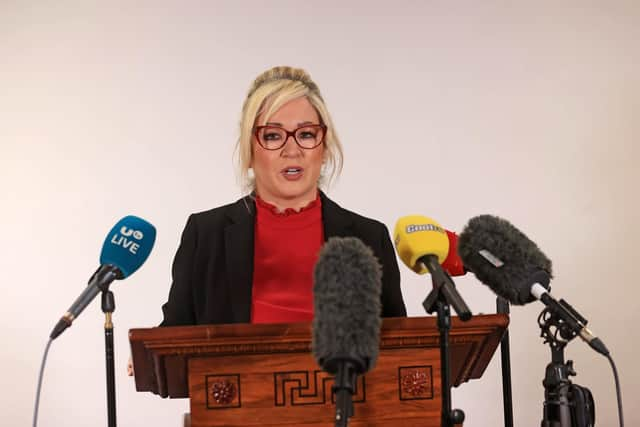Norman Hamilton: Michelle O’Neill did not apologise for IRA abduction, torture and murder in wake of Kenova report, and BBC should not have said that she did


I have long had a particular interest in public ethics and morality in public leadership, so I was genuinely aghast when the BBC News website described the comments of the first minister just after the publication of the Kenova report as an “apology”.
That report called for an apology from the “republican leadership” for the IRA’s “abduction, torture and murder of those it accused or suspected of being agents during the Troubles” and for the acknowledgement of “the loss and unacceptable intimidation bereaved families and surviving victims have suffered”.
Advertisement
Hide AdAdvertisement
Hide AdThe BBC NI coverage (Stakeknife: Report says Army's top IRA spy cost more lives than he saved, BBC website, March 8) said: “Sinn Féin deputy leader Michelle O'Neill, the first minister of Northern Ireland, was asked by the BBC if she would apologise. Ms O'Neill apologised ‘for every single loss of life, and that is without exception’ - something she also said in her first speech after becoming first minister.”


These carefully chosen words were echoed by the president of Sinn Fein Mary Lou McDonald who said she was sorry for “all the lives lost during the conflict and the hurt and loss endured, without exception”.
I do want to be gracious, for I write first and foremost as a Christian pastor and not as a political or social commentator of any kind. But these words fall far short of any credible understanding of what an apology is, or should be. There is a general understanding that an apology includes the taking of real responsibility for the harm or distress caused, with an explanation of why it happened, and the offer to do what can be done to make amends.
The first minister’s “apology” was a general - and I do accept was a genuine - statement of sadness at the loss of so many lives during what we euphemistically call “The Troubles”. But it came nowhere close to the very explicit apology called for in Kenova. There are huge implications of failure to do so. There is no acceptance by her of wrongdoing in the “abduction, torture and murder of those it (the republican movement) accused or suspected of being agents during the Troubles”. This is close to implying that it was “right” or “needed” or “acceptable”, or perhaps even a nuanced restatement of there being “no alternative”. In so doing, the words of regret for every single loss of life are stripped of much of their value.
Advertisement
Hide AdAdvertisement
Hide AdIt is significant that the tánaiste and minister for foreign affairs Micheál Martin in the Irish government also suggested that Sinn Féin should accept that the campaign was “wrong and futile”.
The irony is that almost nobody outside the most repressive regimes in the world would regard torture and abduction as morally acceptable in any circumstances. Given that we are horrified at what we see happening in North Korea or Nigeria or Haiti, then on what basis could it possibly be tolerated – never mind accepted – here in Northern Ireland?
Is repudiation of such awful actions not a moral “given” and a necessity in our modern democracy?
Without this repudiation, reconciliation is virtually impossible, for when relationships and lives are destroyed by the evils of murder and mayhem, and that is not properly acknowledged, the basis for a happily shared society simply evaporates.
Advertisement
Hide AdAdvertisement
Hide AdThe BBC report also raises important and difficult questions for them too. Their coverage suggests that almost any expression of regret or sadness meets their threshold for being described as an apology. By avoiding the need for any real substance in reporting an “apology”, they too impoverish both understanding and our language.
Once again, we have seen ethical and moral poverty at the heart of political life. But of course, we elect our leaders, so any dilution of apology to mere sadness or regret is a widespread acceptance that we simply do what is right in our own eyes. The moral compass of our society does not apparently need to be set to true North.
(Very Rev Dr) Norman Hamilton OBE, Ballymena